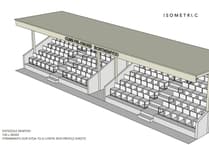A NEW kind of glass made from discarded slate for a Welsh wine producer has been tested for its food preserving qualities by researchers at Aberystwyth University.
Dyffryn Nantlle based Pant Du Vineyard and Orchard produces a range of red, white and rose wines from vines grown in a former slate mining valley in Snowdonia, along with cider and apple juice from local orchards.
As part of its plans to develop a new range of apple cider vinegar, Pant Du turned to researchers at the Food, Diet and Health Research Group at Aberystwyth University to test the freshness preserving properties of the proposed new slate glass. Dark glass has traditionally been used to protect red wine and medicinal products from the effects of light.
The team at Aberystwyth tested the new glass for its ability to block visible light along with infrared and ultraviolet rays, comparing its performance with clear and amber glass.
Working on herbs and soft fruit such as chives and tomatoes, early results indicate that the new slate glass performed better than its clear and amber counterparts. The next phase will be to test with liquids. The work is funded by the Welsh Government’s Future Foods legacy project SMART Recovery.
Richard Wyn Huws from Pant Du Vineyard and Orchard said: “We are delighted to be working with Aberystwyth University on this innovative project and benefit from the expertise and technology there to prove that this new glass works. It is also great to let the world know about the wonderful things that can be produced from slate waste and put Dyffryn Nantlle and the slate heritage of north Wales on the map.”
Dr Amanda Lloyd from Aberystwyth University said: “Each year a huge percentage of food is thrown away with up to 70% caused by households which are not able to consume the amount of food they buy before it becomes inedible. This is why we are interested in testing and developing the slate glass with Pant Du. Additionally it is made from a by-product of the slate industry, which introduces the added element of a natural and locally available material being potentially used for food preservation.”
The initial findings of the research were presented at a workshop hosted by AberInnovation, in March. The workshop focused on how innovative approaches to managing by-products, side-streams and waste can create novel ingredients which can be utilised in healthier foods to support health and well-being, as well as supporting business growth and promote a zero-waste economy.




